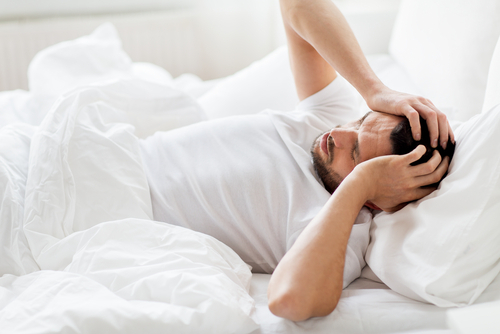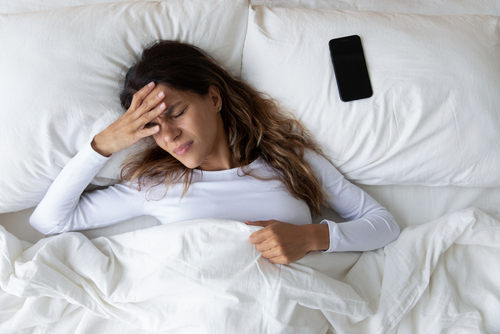Do you often find yourself waking up with a headache in the morning? It can be a frustrating and debilitating way to start your day. In this blog post, we’ll explore the common reasons behind morning headaches from causes such as hypnic, cluster, and migraine headaches to sleep disorders, dietary factors, or other medical conditions. We’ll provide explanations and helpful tips on how to prevent or alleviate them. So, why do I wake up with a headache? Let’s dive into and wake you up the possible causes and solutions.
Why am I Getting Headaches Every Morning When I Wake Up?
It’s been a long exhausting day. You go to be early telling yourself you’ll feel refreshed and great in the morning… until you wake up with a bad headache. Experiencing a headache each morning can significantly impact your quality of life, making it important to uncover the root causes behind this troubling symptom.
Various factors contribute to morning headaches, encompassing primary headache disorders such as hypnic headache, cluster headache, and migraine, as well as sleep-related issues, hydration status, and even chronic health conditions. We’ll discuss all of this.
Sleep disorders such as sleep apnea, insomnia, or disturbances in your circadian rhythm can disrupt your night’s rest, leading to chronic morning headaches upon waking. Similarly, dehydration or inadequate nutrition may play a role, as your body requires a balance of fluids and nutrients to function optimally. Stress and anxiety also cannot be overlooked, as they exert a considerable influence on your physical health, potentially manifesting as headaches in the morning.
Understanding these contributing factors is a vital step toward mitigating the discomfort of waking up with a headache. By paying close attention to your sleep habits, hydration levels, diet, and stress management, you can begin to pinpoint and address the specific causes of your morning headaches, paving the way for more refreshing mornings and productive days.
What Types of Headaches Cause Morning Headaches?
There are 3 main headache disorders that are notorious for their unwelcome presence upon waking. I think it’s important here to differentiate the point that these headaches will often “wake you up” from sleep in the early morning hours, rather than naturally waking up in the morning and noticing the headache is there (although this pattern is also possible).
Among these “wake up headaches“, migraine headaches are the most common type of primary headache (not caused by something else) that people wake up with. They can be of a debilitating nature, characterized by intense pulsing or throbbing pain, typically on one side of the head (but can be both) with nausea and/or sensitivity to light and sound. These can happen in the day or night.
Cluster headaches, although less common, bring an intense debilitating pain around one eye or temple, making them hard to ignore upon awakening. These are associated with symptoms such as a red or teary eye, nasal congestion or runny nose on the same side as the pain. These can happen in the day or night, and often strike in the middle of the night around a similar timeframe for “clusters” of days or weeks at at time.
Hypnic headaches, unique in their timing, specifically disrupt sleep, striking only during the night, waking you from your deep slumber. They have also been called “alarm clock headaches” because they often strike at the same time, like an alarm clock.
Once these 3 types of headaches are excluded, then the search begins to check off all the other potential causes of morning headaches as discussed below. By recognizing the type of headache you’re experiencing, you can tailor your approach to management and treatment, taking a significant step toward reclaiming your mornings from the grip of headache pain.
The Impact of Poor Sleep Quality, Sleep Position, and Pillow Choice on Morning Headaches
The interplay between sleep quality, enough sleep, the positions we adopt while sleeping, and our choice of pillows cannot be underestimated in their contribution to chronic headaches.
Sleep disruptions or insufficient sleep fails to provide the brain and body with the necessary restorative cycles, often leading to headaches upon awakening. I always explain to my patients that during the deep stages of sleep, this is when your brain is replenishing all of its neurotransmitters such as serotonin, acetylcholine, dopamine, etc. If deep restorative sleep stages are not occurring, excess daytime fatigue, brain fog, anxiety, depression, and cognitive complaints (all signs of decreased neurotransmitter levels) are commonly described along with increased headaches. These symptoms can give a good clue to the presence of sleep disorders such as circadian rhythm disorders.
Obstructive sleep apnea (OSA), where breathing pauses during sleep, can significantly interrupt the sleep cycle preventing those deep stages of sleep, and very commonly causes headaches upon awakening. Other common symptoms are daytime fatigue, sore throat in the morning, and cognitive brain fog. Bed partners often describe hearing the patient snoring heavily and sometimes appearing to be choking or stopping breathing intermittently during sleep. A continuous positive airway pressure (CPAP) or bilevel positive airway pressure (BiPAP) machine is often used to treat this, along with other conservative ways such as weight loss.
Additionally, an improper sleep position may strain the neck and shoulders, exacerbating headaches. The importance of a suitable pillow, then, comes into sharp focus; a pillow that is too high, too low, or too firm can misalign the spine, while one that is too soft may fail to offer adequate support, both scenarios paving the way for morning discomfort. The optimal head and neck position during sleep is neutral to the body. In other words, the head should be straight, parallel to the axis of the body as if on a straight line. If the head is tilted too high or too low along the axis of the body during sleep, it can put muscle strain and tension on the occipital nerves and spine. This can trigger occipital neuralgia or cervicogenic headache.
Tailoring your sleep environment to support optimal sleep health—through the careful selection of bedding, the refinement of your sleep posture, and the cultivation of conducive sleep conditions—emerges as a proactive approach to diminish the likelihood of starting your day with a headache.
The Influence of Caffeine, Alcohol, or Medications on Morning Headaches
Caffeine and alcohol hold significant sway over the quality of our sleep, wielding the power to unsettle our rest and precipitate morning headaches. These substances, particularly when consumed in the hours leading up to bedtime, can severely disrupt our sleep cycles.
Caffeine, a potent stimulant found in coffee, tea, chocolate, and some soft drinks, can hinder the body’s natural preparation for sleep by blocking sleep-promoting adenosine receptors in the brain. This disruption can result in a fragmented night’s rest, laying the groundwork for a headache upon waking. Similarly, caffeine withdrawal classically is a morning headache upon waking, which subsides once you get your cup of morning Joe down the gullet. It’s often described as more of a tension type headache, achy, pressure, squeezing, or dull tight band around the head. However, sometimes throbbing migraine attacks can also be triggered by caffeine withdrawal.
Alcohol consumption, despite its initial sedative effects, compromises the latter stages of the sleep cycle, preventing those deep, restorative phases of sleep discussed above. This can exacerbate sleep disorders, such as sleep apnea, further contributing to the risk of morning headaches. The diuretic effect of alcohol also leads to dehydration headache, a common trigger for headaches. Moderation in the consumption of these substances, particularly in the evening hours, can mitigate their negative impact on sleep quality and, by extension, reduce the frequency of waking up with a headache. Awareness and adjustment of one’s caffeine and alcohol intake emerge as simple yet effective strategies for safeguarding against morning headaches.
Patients that take a lot of abortive (acute) medicines for their migraines often make their headaches worse. This is called rebound headache, or medication overuse headache. This type of headache is usually much worse in the morning. As your body eliminates the pain medicine (over the counter pain medicines, triptans, etc.) over night while you sleep, the brain goes into a type of withdrawal state and the migraine is triggered. Once your morning pain meds have gotten back into the system, the early morning headaches improve. This vicious cycle of rebound headache will only intensify over time, so it’s important to discuss an effective way to wean off and detox from these offending medications in a technique that doesn’t cause too much misery.
Dietary Factors, Dehydration, and Their Role in Morning Headaches
Navigating the complex interplay between our diets and morning headaches unveils how essential nutrients, hydration, and meal timing are to preventing this discomfort. A lack of vital nutrients can disrupt the body’s normal functioning, potentially leading to tension headaches or exacerbating migraine conditions. For instance, magnesium deficiency has been linked to increased frequency of migraines, highlighting the need for a nutrient-rich diet.
Similarly, dehydration stands as a significant yet often overlooked contributor to morning headaches. During sleep, our body continues to lose fluids through respiration and perspiration. Starting the day without replenishing these lost fluids can lead to a dehydration-induced headache, characterized by a dull, throbbing pain. Ensuring adequate water intake throughout the day and before bed can mitigate this risk, offering a simple yet effective means of preventing morning headaches. A good rule of thumb is to drink half of your body weight in ounces of water each day. For example, someone weighing 200 pounds should drink 100 ounces of water daily.
Moreover, irregular eating patterns, such as skipping meals or late-night eating, can influence blood sugar levels, leading to headaches upon waking. Establishing a consistent meal schedule that includes a variety of nutrient-dense foods supports not only overall health but also contributes to a reduction in the occurrence of morning headaches. Avoiding and observing for common foods and food additives known to trigger migraines is also crucial. This approach to diet and hydration exemplifies the proactive steps individuals can take to enhance their well-being and start their days free from the burden of headache pain.
Identifying and Managing Chronic Medical Conditions
Chronic medical conditions such as high blood pressure often lurk behind the scenes as silent contributors to morning headaches. Recognizing and effectively managing these conditions is a crucial step in mitigating the start-of-day discomfort that many people face.
Sinus infections can create pressure and pain that is particularly noticeable first thing in the morning. More severe conditions, like a brain tumor, though rare, can also manifest as morning headaches and should not be disregarded. This is why any type of headache, regardless of pattern, should always be discussed and evaluated by a doctor. Temporomandibular joint (TMJ) disorders, which affect jaw movement and alignment, can cause pain that radiates through the skull, jaw, and temples upon waking. Sleep bruxism (grinding teeth and clenching jaw) can also exacerbate TMJ dysfunction, pain, and morning headaches.
Another less common cause of morning headaches could potentially be related to Idiopathic Intracranial Hypertension (IIH), previously called pseudotumor cerebri. This is a disorder in which the cerebrospinal fluid (CSF) is too high. This disorder comes with a variety of other symptoms such as pulsatile tinnitus (whooshing in the ears), and visual disturbances (can be blurriness or quick black outs of vision called transient visual obscurations or TVOs).
Addressing these underlying issues often requires a comprehensive approach, including medical diagnosis and potentially specialized treatment plans which may include seeing other medical specialists such as a dentist. Engaging with healthcare professionals to explore these conditions not only opens the door to effective management strategies but also ensures that treatment is tailored to the individual’s specific needs.
Stress and Anxiety as Triggers for Morning Headaches
Navigating the complex landscape of stress and anxiety offers a critical insight into their role as catalysts for morning headaches. The intricate relationship between our psychological state and physical well-being manifests distinctly in how stress and anxiety can precipitate the onset of headaches, particularly upon awakening. These emotional states trigger a cascade of physiological responses—increasing muscle tension, particularly around the neck and scalp, and altering blood flow patterns, which in turn can lead to headache symptoms.
Embracing strategies to manage stress and anxiety is not merely beneficial but essential for those seeking relief from morning headaches. Techniques such as deep breathing exercises, relaxation techniques, yoga and mindfulness meditation have shown efficacy in reducing the frequency and severity of headaches by lowering stress levels. Additionally, establishing a routine that incorporates these practices before bedtime can further enhance the quality of sleep, creating a more favorable condition for waking free of headache pain.
For individuals grappling with stress and anxiety, reaching out for professional support can provide a tailored approach to managing these triggers. Cognitive-behavioral therapy (CBT), for example, offers tools to reframe negative thought patterns that may exacerbate anxiety and, by extension, headache symptoms. By proactively addressing stress and anxiety, you lay the groundwork for not only alleviating morning headaches but also improving overall mental and physical health.
The Importance of Proper Room Ventilation and Air Quality
The quality of air in our sleeping environments plays a significant yet often undervalued role in determining the quality of our sleep and, by extension, the risk of awakening with a headache. Ensuring that your bedroom is well-ventilated contributes to a decrease in potential pollutants and allergens that can disrupt sleep patterns and exacerbate headaches. The presence of these irritants can trigger allergic reactions, sinus congestion, or even exacerbate conditions such as sleep apnea, leading directly to a poor night’s sleep and the consequent morning discomfort.
Employing air purifiers can significantly reduce the concentration of these airborne particles, while maintaining a clean sleeping environment free of dust and pet dander further helps in preventing morning headaches. Additionally, the introduction of fresh air through proper ventilation can enhance oxygen levels, promoting deeper and more restorative sleep cycles.
This attention to air quality and ventilation not only supports a healthier sleep environment but also acts as a preventive measure against the common yet troubling issue of waking up with a headache. Prioritizing the purity of the air we breathe while we rest emerges as a crucial component of a holistic approach to improving sleep health and mitigating morning headaches.
The Role of Physical Activity and Exercise
Engaging in regular physical activity stands as a cornerstone for not only maintaining overall health but also for its potential to ameliorate the frequency and intensity of morning headaches. Exercise, by its nature, facilitates stress reduction, aids in the regulation of sleep patterns, and fosters improved blood flow throughout the body. These benefits collectively contribute to enhanced sleep quality, a critical element in the prevention of morning headaches.
The connection between physical activity and reduced headache symptoms is well-documented, with moderate aerobic exercise, in particular, showing promise in mitigating the impact of tension and migraine headaches. It’s essential, however, to approach exercise with balance and awareness of one’s limits, as excessive physical exertion without adequate rest can inadvertently trigger headaches. Exercising earlier in the day is also better than in the evening because the adrenaline released during exercise can potentially cause insomnia for some.
Establishing a consistent exercise regimen that aligns with personal fitness levels and preferences can serve as a proactive strategy to enhance sleep quality and reduce the likelihood of waking up with a headache. Any exercise routine should be discussed with your doctor.
This approach underscores the importance of integrating physical activity into daily life as part of a comprehensive strategy to improve sleep and minimize morning headaches, highlighting exercise’s role in promoting a healthier, more invigorated start to the day.
When to Seek Professional Medical Advice
Morning headaches can often be managed through adjustments in lifestyle and diet, attention to sleep health, and stress management techniques. However, there are instances where the persistence, severity, or sudden onset of morning headaches signals the need for a more thorough investigation.
If your headaches significantly disrupt your daily routine, escalate in intensity, or are accompanied by other concerning symptoms such as visual disturbances, nausea, or neurological changes, consulting with a healthcare provider becomes imperative. Any type of headache should be evaluated by a doctor, especially with these features. Furthermore, evaluations for morning headaches should include a brain MRI preferably, or at least a brain CT scan if an MRI is not an option.
These experts can help identify any underlying conditions, ranging from sleep disorders to more serious health concerns, and guide you toward the most effective treatment options. Addressing morning headaches with a medical professional not only aids in alleviating symptoms but also ensures a focused safe approach to improving your overall health and wellbeing.
IF YOU HAVE HEADACHE, MIGRAINE, OR FACIAL PAIN AND ARE LOOKING FOR ANSWERS ON ANYTHING RELATED TO IT, A HEADACHE SPECIALIST IS HERE TO HELP, FOR FREE!
FIRST, LET’S DECIDE WHERE TO START:
IF YOU HAVE AN EXISTING HEADACHE, MIGRAINE, OR FACIAL PAIN DIAGNOSIS AND ARE LOOKING FOR THE LATEST INFORMATION, HOT TOPICS, AND TREATMENT TIPS, VISIT OUR FREE BLOG OF HOT TOPICS AND HEADACHE TIPS HERE. THIS IS WHERE I WRITE AND CONDENSE A BROAD VARIETY OF COMMON AND COMPLEX MIGRAINE AND HEADACHE RELATED TOPICS INTO THE IMPORTANT FACTS AND HIGHLIGHTS YOU NEED TO KNOW, ALONG WITH PROVIDING FIRST HAND CLINICAL EXPERIENCE FROM THE PERSPECTIVE OF A HEADACHE SPECIALIST.
IF YOU DON’T HAVE AN EXISTING HEADACHE, MIGRAINE, OR FACIAL PAIN DIAGNOSIS AND ARE LOOKING FOR POSSIBLE TYPES OF HEADACHES OR FACIAL PAINS BASED ON YOUR SYMPTOMS, USE THE FREE HEADACHE AND FACIAL PAIN SYMPTOM CHECKER TOOL DEVELOPED BY A HEADACHE SPECIALIST NEUROLOGIST HERE!
IF YOU HAVE AN EXISTING HEADACHE, MIGRAINE, OR FACIAL PAIN DIAGNOSIS AND ARE LOOKING FOR FURTHER EDUCATION AND SELF-RESEARCH ON YOUR DIAGNOSIS, VISIT OUR FREE EDUCATION CENTER HERE.



